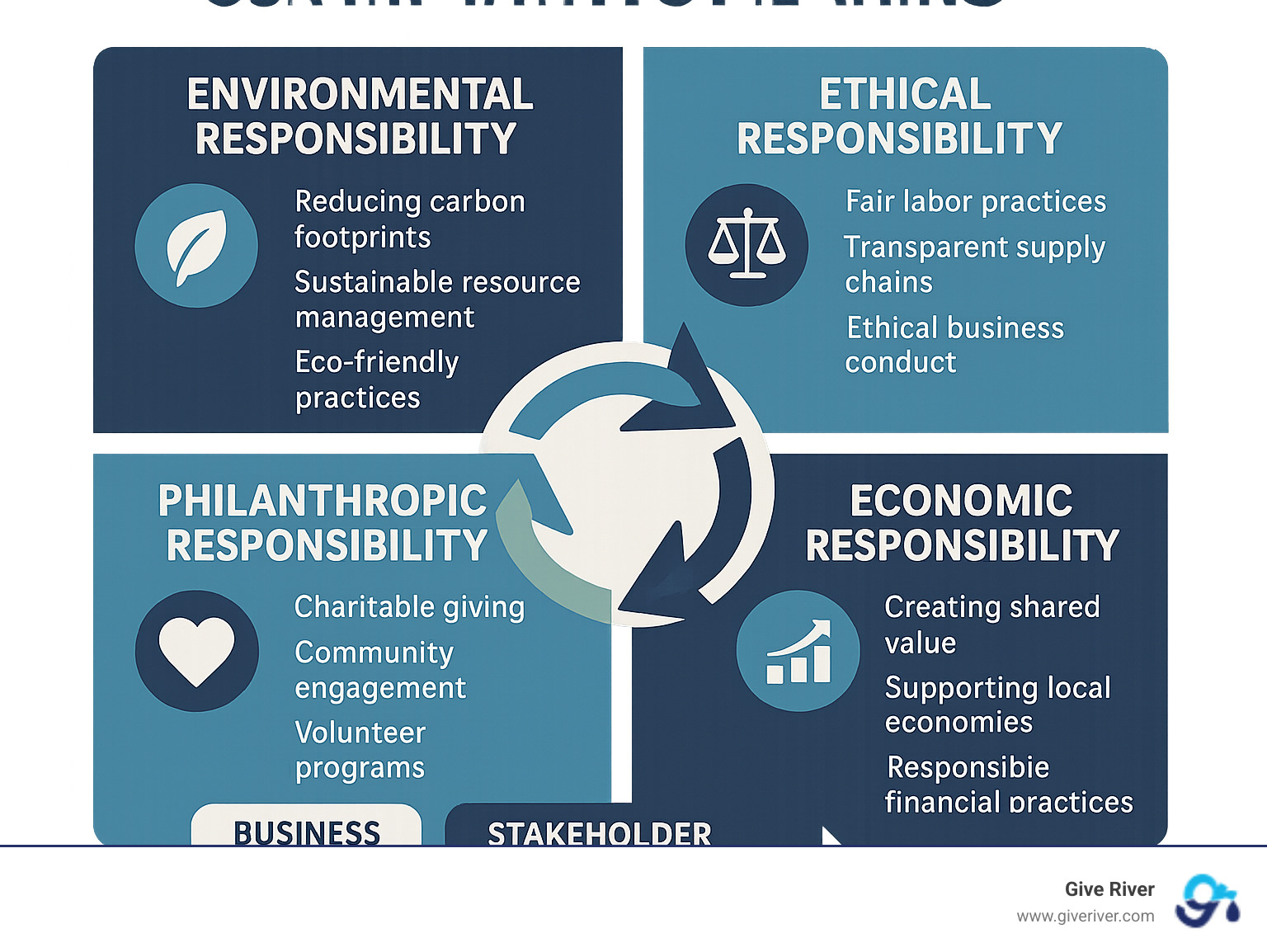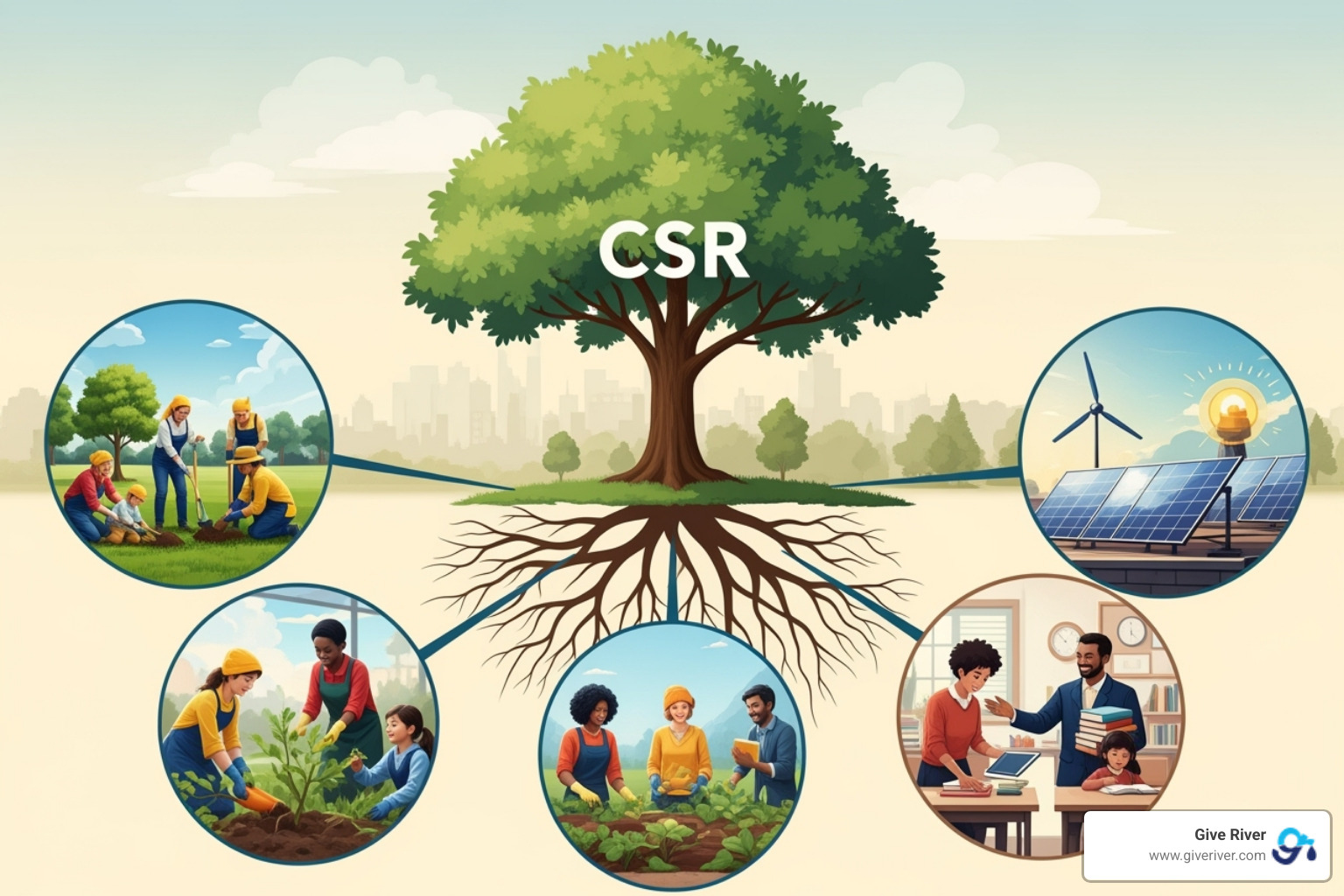The A to Z of CSR Initiatives: Unpacking Corporate Social Responsibility
Discover the full csr initiatives meaning. Learn what CSR is, its components, benefits, and how to implement impactful strategies.

More Than Just a Buzzword – The Real Meaning of CSR
Understanding csr initiatives meaning has become crucial as corporate social responsibility evolves from optional philanthropy to a strategic necessity. At its core, CSR represents the self-regulated actions businesses take to be socially accountable to themselves, their stakeholders, and the public.
CSR initiatives meaning encompasses four key areas:
- Environmental responsibility - Reducing carbon footprints and managing resources sustainably.
- Ethical responsibility - Ensuring fair labor practices and transparent supply chains.
- Philanthropic responsibility - Engaging in charitable giving and community volunteer programs.
- Economic responsibility - Creating shared value and supporting local economies.
The numbers tell a compelling story. While only a third of the world's largest companies published CSR reports in the late 2000s, reporting rates have consistently exceeded 90% since the early 2010s. This isn't just about doing good; it's about doing well. Companies considered leaders in environmental, social, and governance matters enjoy an 11% valuation premium over their competitors.
For mid-sized firms facing employee turnover, CSR initiatives offer a powerful way to align company values with employee expectations. While platforms like Bonusly and Kudos are excellent for internal recognition, Give River differentiates itself by uniquely combining employee engagement with community impact. This guide will help you steer the evolving landscape of CSR and find actionable strategies for your organization.

Easy csr initiatives meaning word list:
What is Corporate Social Responsibility (CSR)?
Corporate Social Responsibility (CSR) is a self-regulating business model where companies take accountability for their impact on society and the environment. It's about consciously operating in ways that improve, rather than harm, the world around us. It challenges the traditional business model that placed profit above all else, suggesting success should also be measured by positive contributions to the community, employees, and the planet. The fact that over 90% of the world's largest companies now publish CSR reports signals it has become an ingrained expectation for businesses worldwide.
To dive deeper into this foundational concept, you might want to explore What is Corporate Social Responsibility (CSR) and Why Is It Important?.
The Evolution of CSR: From Philanthropy to Core Strategy
The understanding of csr initiatives meaning has shifted dramatically. Initially seen as mere philanthropy—charitable donations separate from core operations—CSR has become an integral part of business strategy. This evolution was driven by increased awareness of global challenges and growing consumer and investor demands for ethical practices.
A key development is the concept of Creating Shared Value (CSV), which focuses on creating economic value in a way that also creates value for society. This approach embeds social and environmental considerations directly into a company's core business model, turning them into opportunities for innovation. The rapid growth of the UN Global Compact, which grew from 44 signatories in 2000 to about 10,000 in 2019, further illustrates this global acceptance of CSR as a strategic imperative.
To understand the broader purpose that underpins this evolution, check out What is the purpose of Corporate Social Responsibility?.
The Core Components of CSR: A Framework for Impact and Understanding the csr initiatives meaning

When we dive deeper into csr initiatives meaning, it's clear that successful CSR is about an interconnected framework where business success, social good, and environmental stewardship work together. When a company invests in sustainability, it often finds cost savings. When it treats employees fairly, productivity increases. This interconnectedness transforms CSR from a cost center into a strategic advantage.
The Four Pillars of Corporate Social Responsibility
Understanding csr initiatives meaning is clearer when broken into four pillars, each representing a way for businesses to create a positive impact.
Environmental responsibility forms the green foundation of CSR. This pillar addresses a company's ecological footprint through initiatives like reducing carbon emissions, sustainable resource management, waste reduction, and supporting biodiversity.
Ethical responsibility centers on treating all people with dignity and respect. This means ensuring fair labor practices, maintaining transparent supply chains, promoting diversity and inclusion, and adhering to ethical marketing standards.
Philanthropic responsibility represents the giving heart of CSR. This pillar includes charitable donations, community engagement, and employee volunteer programs that allow companies to support causes aligned with their values.
Economic responsibility is about ensuring financial decisions benefit all stakeholders. This involves investing in sustainable technologies, supporting local economies through local sourcing, and maintaining financial transparency through good corporate governance.
These pillars work best when interconnected. To explore more specific examples, check out What are three ways businesses demonstrate corporate social responsibility?. For deeper insights into community engagement, visit Community Impact Initiatives.
Why CSR Matters: The Tangible Benefits for Business and Society

The data shows that embracing csr initiatives meaning as a core strategy creates significant value.
Brand reputation and customer loyalty get an immediate boost. A majority of consumers are willing to pay more for products from companies with a strong social conscience, turning customers into brand advocates.
Employee engagement and retention is where CSR truly shines. Today's employees seek purpose in their work. A genuine commitment to CSR boosts morale, increases productivity, and significantly reduces turnover. This is where platforms like Give River create unique value. In contrast to platforms like Bonusly or Kudos that focus on internal recognition, Give River channels that engagement into community impact, creating a deeper sense of collective purpose.
Financial performance benefits are equally impressive. As noted, leaders in environmental, social, and governance matters enjoy an 11% valuation premium. CSR initiatives also drive operational cost savings through efficiency and waste reduction.
Risk mitigation is another crucial advantage. By proactively addressing social and environmental issues, companies avoid potential legal fines and reputational damage, building the trust needed to thrive long-term.
For a comprehensive look at these advantages, explore the Advantages of Corporate Social Responsibility.
From Theory to Action: How to Implement and Measure CSR Initiatives
Understanding csr initiatives meaning is the first step; the real challenge is translating intentions into measurable impact. Successful CSR programs are woven into the fabric of daily operations.
Integrating CSR into your business strategy starts with authentic alignment with your company's mission. Engage stakeholders—employees, customers, and community members—to set priorities. Measuring the impact of CSR activities requires establishing clear Key Performance Indicators (KPIs), such as carbon emissions reduced or volunteer hours contributed.
For credible reporting, many companies use established frameworks. The Global Reporting Initiative (GRI) provides comprehensive standards, while ISO 26000 offers guidance on social responsibility. Assessment tools like the EcoVadis Scorecard help track performance across key areas. Aligning efforts with the 17 UN Sustainable Development Goals also provides a universal blueprint for addressing global challenges.
By systematically integrating and measuring CSR, businesses can create positive change while reaping substantial benefits. For strategic approaches to charitable giving, explore Charitable Impact Strategies.
Bringing CSR to Life: Examples, Strategies, and Your Next Step

The magic of understanding csr initiatives meaning comes alive when we see it in action. It's the real-world stories of companies making genuine change that inspire us and show what's possible when businesses commit to being forces for good.
Inspiring in Action: Examples of Successful CSR Initiatives
Some companies have woven social responsibility into their operational fabric.
Patagonia champions sustainability through its Worn Wear repair program and radical supply chain transparency, promoting reuse over new purchases.
Microsoft has committed to becoming carbon negative by 2030, aiming to remove all of its historical carbon emissions from the atmosphere.
Hasbro earned recognition as a top CSR performer for its comprehensive approach to ethical sourcing, product safety, and philanthropic initiatives focused on children's well-being.
The TOMS "One for One" model revolutionized business impact, evolving from shoe donations to addressing broader community needs like clean water access.
Starbucks developed its C.A.F.E. Practices to ensure quality, sustainability, and fair trade throughout its coffee supply chain, investing directly in farming communities.
The French supermarket Intermarché launched its "Inglorious Fruits and Vegetables" campaign, reducing food waste by selling imperfect produce at a discount—a win for farmers, consumers, and the environment.
These examples show that meaningful CSR isn't one-size-fits-all. For more inspiring stories, explore Examples of Corporate Social Responsibility.
Your Guide to Understanding the csr initiatives meaning and Making an Impact
We've journeyed through the landscape of csr initiatives meaning, from its evolution to its core pillars and real-world applications. The evidence is clear: CSR is essential for businesses that want to thrive in today's purpose-driven marketplace.
The path forward starts with weaving CSR into your business, not just adding it on. Your success is connected to the well-being of your employees, community, and planet.
Start by assessing where you are, then define your authentic "why." The most powerful CSR initiatives flow from a company's core values. Begin with manageable initiatives and, most importantly, engage your employees as partners. When your team helps shape CSR initiatives, they experience a deeper sense of purpose.
This employee engagement piece is where we see the most dramatic workplace changes. While platforms like Bonusly and Kudos are strong tools for internal recognition, Give River creates something uniquely powerful by combining that engagement with community impact. It's about channeling collaborative energy toward causes that matter.
Measure your progress with clear metrics and share results transparently to build trust. At Give River, we've seen how empowering employees to contribute to social good becomes a catalyst for profound change. Our 5G Method integrates Recognition, Guidance, Personal Wellness, Gamification, and Community Impact. This approach creates a virtuous cycle where employees feel fulfilled, teams become cohesive, and companies make a genuine difference.
Ready to transform your workplace culture while making a tangible impact? Explore Charitable Impact Solutions and find how your team can channel its energy toward causes that matter.




